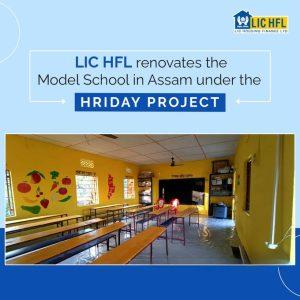The HRIDAY Project is our flagship rural development initiative, supported by LIC Housing Finance Ltd. under its HRIDAY CSR initiative. The project targets 20 remote villages in the Syaldey Block of Almora District, Uttarakhand. It aims to bring about socio-economic transformation through an integrated approach focusing on sustainable livelihoods, community empowerment, health, education, and renewable energy.
LIC HFL Hriday Project Objectives
- Enhance Rural Livelihoods: Promote income-generating activities such as goat rearing and traditional crop cultivation using sustainable practices.
- Strengthen Local Institutions: Build grassroots governance through active and accountable village-level institutions.
- Improve Rural Infrastructure: Enhance access to renewable energy, irrigation, healthcare, and educational facilities.
- Foster Government Convergence: Ensure alignment with public welfare schemes for greater reach and sustainable impact.
Key Interventions
Livelihood Enhancement
Goat Rearing Promotion: Distribution of high-yielding, disease-resistant goat breeds to selected households. Hands-on training in scientific goat rearing, health, and breed management.
Millets and Pulses Cultivation: Revival of traditional, climate-resilient crops. Distribution of quality seeds and promotion of improved, low-input and organic farming techniques to
enhance soil health and reduce costs.
Organic Vegetable Farming: Support for seasonal and off-season vegetable cultivation
using modern, water-efficient techniques. Training in composting, natural pest control, and organic farming practices.Institution Building
Farmer Interest Groups (FIGs): Formation of 20+ FIGs to encourage collective action, knowledge sharing, and joint marketing. Training in leadership, bookkeeping, and agri-entrepreneurship.
Village Development Committees (VDCs): Establishment of VDCs in each project village to plan, implement, and monitor development activities. Capacity building in participatory governance, transparency, and asset maintenance.Water and Energy Access
Gravity-Based Irrigation Systems: Construction of low-cost, gravity-fed irrigation structures to support year-round cultivation in water-scarce areas.
Solar Street Lighting: Installation of solar-powered lights in key community locations to improve public safety, especially for women and children and to promote clean energy.Health & Education Initiatives
Health Camps: Regular health check-ups with a focus on maternal and child health. Awareness sessions on hygiene, nutrition, reproductive health, and disease prevention. Linkages with government healthcare for referrals and follow-ups.
School Renovation: Upgrading village schools through repairs, sanitation improvements, and clean drinking water facilities. Engagement of School Management Committees (SMCs) and community members to sustain improvements.Awareness & Capacity Building
Government Scheme Awareness: Conducting awareness sessions on key government schemes related to agriculture, livestock, health, and rural development.
Documentation Support: Assisting community members in documentation and enrolment processes to ensure better access to entitlements and benefits.
Expected Outcomes
Enhanced Livelihoods: Increased household income through diversified, sustainable farming and livestock practices.
Empowered Communities: Active and capable village institutions leading local development initiatives.
Improved Infrastructure: Better access to clean energy, functional irrigation, and improved school and health facilities.
Sustainable Development: Adoption of eco-friendly agricultural practices and renewable energy solutions.
Strengthened Resilience: More informed, self-reliant, and organized communities equipped to manage development challenges effectively.